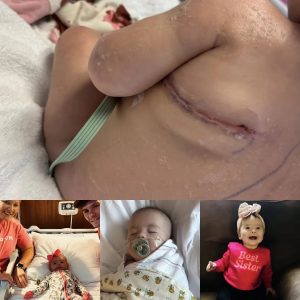After losing his wife Marla to cancer, Eric’s life slowly collapsed into silence and numb routine. Thanksgiving, once a cherished holiday, had become a painful reminder of everything he’d lost. His world narrowed to his daughter Sarah, the only reason he kept moving. When she eventually moved overseas, the house felt cavernous, and Eric slipped further into loneliness. On one particularly empty Thanksgiving morning, he forced himself through motions that once grounded him—making coffee, putting on the brown jacket Sarah had gifted him, and going to the grocery store. There, outside under a bare maple tree, he saw a woman sitting alone, trembling, coatless, and staring at the ground with a hollowness he recognized. Guided by the memory of Marla’s kindness, he offered her his jacket, some groceries, and quietly scribbled his address in case she ever needed help. That night, he lied to Sarah, pretending he’d cooked a proper Thanksgiving meal, but all he could think about was whether the woman was safe. The moment passed, and life drifted on, the memory settling into a quiet corner inside him.
Two years later, during a Thanksgiving gathering with Sarah and her husband, the doorbell rang—revealing the same woman from the grocery store, now healthy, steady, and carrying a small backpack. Her name was Charlotte. She returned Eric’s jacket, carefully folded, and handed him a small wooden box containing her father’s gold watch and a check for $20,000. Confused, Eric insisted he couldn’t accept it, claiming he didn’t even know her. But Charlotte explained that his act of compassion had saved her life. At the time he’d found her, she’d been preparing to end everything. Her husband Levi—initially charming—had taken complete control of her inheritance, destroyed her career, isolated her, and manipulated her until she felt worthless. Two months before that day under the maple tree, she had miscarried, and the grief, combined with Levi’s cruelty, had pushed her to the brink. Eric’s simple kindness—food, warmth, and a reminder of human decency—had stopped her from disappearing. Inspired to fight, she sought help from a retired attorney who had known her father. Together they built a case, uncovered fraud, and exposed Levi and his mistress. Her name was restored, her inheritance returned. She kept Eric’s jacket with her the entire time as a reminder that she was worth saving.
Charlotte explained that the watch was her father’s and that he would’ve liked Eric. The check wasn’t repayment, she said—it was seed money, meant for Eric to help someone else who might one day need a moment of grace. The gesture left Eric speechless. As she prepared to leave, Charlotte wrote down her number, and when the door closed, the house felt different—warmer, no longer sealed in grief. That moment marked the beginning of a new chapter. Over the next year, Charlotte slowly entered their lives, returning for conversations, coffee, shared updates, and eventually for Thanksgiving dinner itself. She brought sweet potato casserole with toasted marshmallows, a dish Marla used to make, stirring memories and unexpected comfort. Sarah welcomed her with playful teasing, convincing her to try cranberry sauce, which Charlotte declared tasted like “jelly’s eccentric cousin.” Even in small moments, the house felt alive again, the air less heavy, the rooms filled with laughter instead of loss.
Over time, a quiet bond formed between Eric and Charlotte, one built not on dramatic declarations but on shared resilience. Each had been wounded by life in different ways, yet both had found healing through an exchange of kindness that was never meant to ripple so far. Eric began seeing that his action didn’t just save Charlotte—it saved him, too. Her presence filled the space Marla once held without diminishing her memory. The grief remained, but it softened, reshaping itself into gratitude. He found himself looking forward to conversations, to moments shared in silence, to a future he once believed he no longer had. Charlotte became a steady presence, not replacing the past but enriching the present. And through her, Eric rediscovered the parts of himself he thought had withered away after Marla’s death.
The brown jacket now rests in a wooden box in the hallway—no longer just a piece of clothing but a symbol of the day everything began to shift. Inside it lives a story of loss, chance, compassion, and the unexpected paths healing takes. Eric often thinks Marla nudged him toward Charlotte that day outside the grocery store, guiding him to extend the warmth she once gave him so freely. What began as the smallest act of kindness—one jacket, one bag of groceries, one moment of seeing someone others ignored—became a thread pulling two broken lives toward hope. It is a reminder that kindness doesn’t vanish when given; it circles back in ways no one can predict, carrying with it new names, new stories, and new futures.




